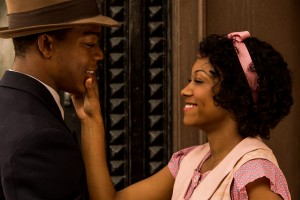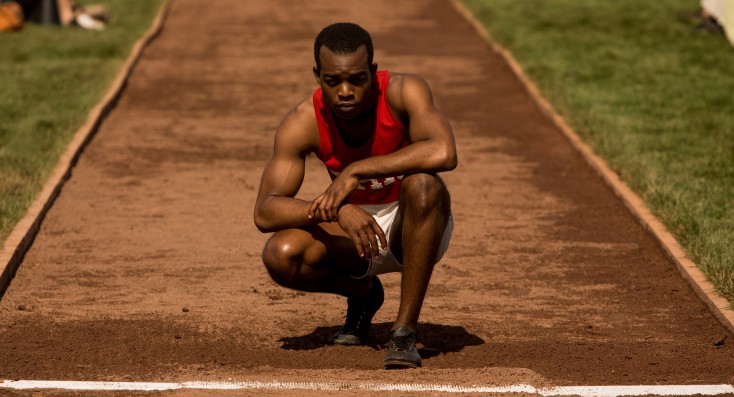
Stephan James (left) stars as Jesse Owens and Shanice Banton (right) stars as Ruth Solomon in Stephen Hopkins’ RACE. ©Focus Features. CR: Thibault Grabherr.
By ANGELA DAWSON
Front Row Features
HOLLYWOOD—Stephan James is only 22, but already the Canadian actor has learned quite a bit about the deep-rooted history of racism in North America through his portrayal of several real-life and fictional historic figures.
He played civil rights activist John Lewis (later an influential U.S. congressman) in Ava DuVernay’s acclaimed “Selma.” He starred in the “The Book of Negroes,” a Revolutionary War period miniseries drama about the slave trade, based on Lawrence Hill’s bestselling novel. He also appeared in the Canadian drama “Undone,” which explored simmering racial tensions in Nova Scotia.
The Toronto-born actor now plays U.S. Olympic champion Jesse Owens, who not only had to overcome racism at the 1936 Olympics in Berlin, but he also had to stand up to it at home. He was dubbed “the fastest man on earth” after winning a then record four gold medals in track and field, yet he was never invited to the White House to be congratulated by FDR.
Director Stephen Hopkins said of James, “He reminds me a lot of Jesse on the outside, but inside there is something else. Stephan is made of steel on the inside.”
At an interview, James exuberantly spoke about why he wanted to play the role, uncovering the character and working with co-stars Jason Sudeikis, who plays his supportive coach Larry Snyder and David Kross, who plays his chief competition on the track. He also revealed what superhero character he would like to play someday.
Q: Can you talk about the process of going up for the part, auditioning for the part and your feelings when you got the part, as well as what you thought of Jesse Owens.
James: When I first read the script, I said to my manager, “I’ve got to find a way to get into this film.” I didn’t know where I would fit. I wanted to play Jesse, but I was fine with playing Jesse’s best friend or whoever. For me, I just wanted to be a part of this story. Nonetheless, I got a meeting with Steven and I met him in Montreal. We had a conversation for a couple of hours. Real casual. He talked about his vision for the film and things like that. Then I gave him my take on Jesse and left it alone for a couple of weeks. Then I got a call saying I was going to play Jesse.
Q: What did you know about Jesse Owens before you read the script?
James: Very little. I had to research and remind myself about who he was and what he had done. Then obviously, I was blown away to have the opportunity to even audition.
Q: You have said that it is important for stories like this to not get lost in history. Was there any element of aspect about his life that really resonated with you?
James: More than the athlete he was—the fastest man on the planet—I was attracted to him as a human being. I learned so many things about him as a man, as a father, that really blew me away. The type of humanitarian he was. He was the type of person who treated everyone exactly how he wanted to be treated. He was colorblind; he didn’t see color. He only saw the love of his sport—running. Through that he was able to transcend the sport. That’s what I brought to him. When people think of Jesse Owens, they think about this big athlete, the superstar, fastest man alive but I wanted to bring a level of humanity to this hero.
Q: You talked to his daughters about him. What stuck in your mind?
James: I got to hang out a lot with his daughter. They’ve been instrumental in the whole filmmaking process from the beginning, from the script writing stages. They were in the writing room. Those things are so helpful on the ground, the foundation, and for me, just being around them. They speak to be all day long with stories about their father. To them, he’s not this big track star, he was just daddy. Their input was invaluable to me.
Q: What got you into acting?
James: I feel like I’ve been acting all my life. Ever since I was a kid, I was fascinated with impersonations. Not even really famous people, just people we’d run into in the street or people in my family. I also liked being people outside of myself. It was fun, like playtime for me. I’ve been acting professionally for about six or seven years now. It started in high school. That’s when I started to take the theater program seriously. I’ve always been a little shy even though I liked doing those things, but acting is one of those things that I could use to express myself. I started realizing how people were reacting to me and the things I was doing, it gave me confidence to get representation and go into film and TV.
Q: What did you and David Kross, who plays Carl “Luz” Long, the German track and field star and chief competitor at the Olympics, do to prepare for your scenes?
James: David is an incredible actor so just to be around him, I can’t say it was too difficult to work with him. You look at the friendship that he and Jesse formed. Jesse went over to Nazi Germany and became best friends with the German long jumper. People didn’t expect to see that relationship happen, and they remained friends for their entire lives, until Luz passed away. It really embodies the type of lives we should all lead. It’s not about black or white or what you look like, or where you come from, it’s really about focusing on the things that unite us and for them it was running, the love for track. That overpowered anything that could separate them.
Q: What did you learn about that period—the 1930s?
James: I was just going to have to learn about the time. And if I hadn’t gone through some of this stuff myself, I would have to learn about what it was and what that was like, and immerse myself in those worlds.
Q: As an Canadian, what do you think about the racial tensions here in the U.S. during that period?
James: To me, it’s so much bigger than just an American problem. It’s not just an American problem; it’s a problem the world over. I was in no place to judge America any differently than the rest of the world. I just took the information for what it was, the things I learned about that time and about Jesse and how he did things. His relationship with Larry (the coach) wasn’t perfect at first. He had to get comfortable with a person like that, an authoritative person that didn’t know. He had to get used to that relationship with Coach Larry. But over time, you can see in the film that he is able to look Larry in the face, and they become more than just coach and athlete, they become friends.
Q: How was it working with Jason Sudeikis, actor to actor?
James: He was great. We met up pretty early on, hung out in New York. I just got to talk to him. We never really talked about the script too much in the first days. We just tried to build a foundation with each other, and it happened pretty quickly, I must say. He’s a huge sports guy and we would just talk basketball, baseball, whatever, all day. We connected over sports. I think people are going to be pleasantly surprised at what he is able to do in this film. I think he’s so much more than just a comedic actor. People are going to be able to finally see that. It was easy to work with him and it didn’t help that he was funny, more so off set than on set because of the serious things we were dealing with, but we definitely had our moments.
Q: What was the key thing you found in finding Jesse, was it his autobiography, a piece of footage?
James: It was more so hearing from his daughters. That was better than anything I could have found on the Internet. Learning from them who he was as a person, that was it. I knew that if I could tap into that, people would be interested in watching the film.
Q: Do you have any aspirations to do any directing or writing yourself?
James: Yeah, I write all the time. I have a pilot written and some film ideas. On set, I like to hang out with the director, stand behind the monitor to see how the director does things. Taking in camera angles, how to shoot things. I’ve always been watching the monitor a lot. I want to tell different kinds of stories. I don’t only want to tell black stories or historical stories. I don’t just want to do biopics but a bunch of different genres, from sci-fi to action to thrillers. I want to play Spider-Man one day. I don’t ever want to limit myself.





